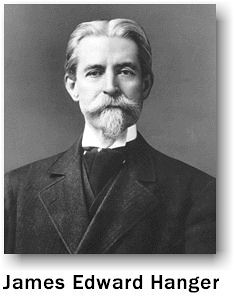
Volume III, Issue VII
Man and Machine... Immortality or Terror?
Is the 'other' Weekly News Magazine [click to read] a Science Fiction magazine now? Raymond Kurzweil may be able to make a machine mimic human intelligence. Hey, a computer can even win at chess or Jepoardy, but didn't Stanley Kubrick explore the dark side of this all in the movie 2001? As Dave disables the malevolent "Hal," it becomes clear that human miscalculation of machine dependability has even greater reprocussions when one pushes them to extreme heights. Machine assisted immortality smacks of Nimrod's 'Tower to the Heavens' as well. One is messing around in the Divine's private chambers here.
That is not to say that machines have no place in improving the human contition. Consider the story of James Edward Hanger, a resident of Churchville Virginia in the Nineteenth Century. Hanger lost his leg in the Civil War and was recuperating in his Churchville home when he surprised his family by fabricating an artificial leg from whittled barrel staves.
"Hanger was a Churchville teen who wanted to enlist in the Grand Army of the Republic in 1861. A food ambulance corps, laden with supplies for the Confederacy, passed through town on its way to West Virginia. Hanger hung on to the group and bedded down with them in a nearby barn, fired up and ready to go. At dawn he woke suddenly to the sound of gunfire. Hanger jumped from a hayloft to grab his horse, but he never left town. In the skirmish, he was severely wounded by a cannonball." -- Sharon Cavileer, "The First Amputee of the Civil War."
Union troops found the wounded Hanger and a surgeon amputated his leg above the knee. His invention thus required him to hinge the prosthesis to simulate the flexibility of the human knee. The state commissioned Hanger to make artificial limbs for other veterans. Hanger founded Hanger Orthopedic, a company to manufacture the device. When he died in 1919, the J. E. Hanger Company had branches in London, Paris, Philadelphia, Pittsburgh, Atlanta, and Saint Louis.

Today assistive technology is reaching new heights. Radio Host Rush Limbaugh is deaf but is able to do his show thanks to modern technology. Might we look forward to a day when the blind might see, thanks to digital signals delivered to the brain?
Alexander Graham Bell did much of his work in the hopes of giving hearing to the deaf. Today's pioneers in invention are challenging new frontiers as well.
But the Holy Scriptures tell us that the Lord knows the number of a man's days, and that life does indeed continue... but not here. Eternity holds wonderful promises for those who would seek its Master!




No comments:
Post a Comment